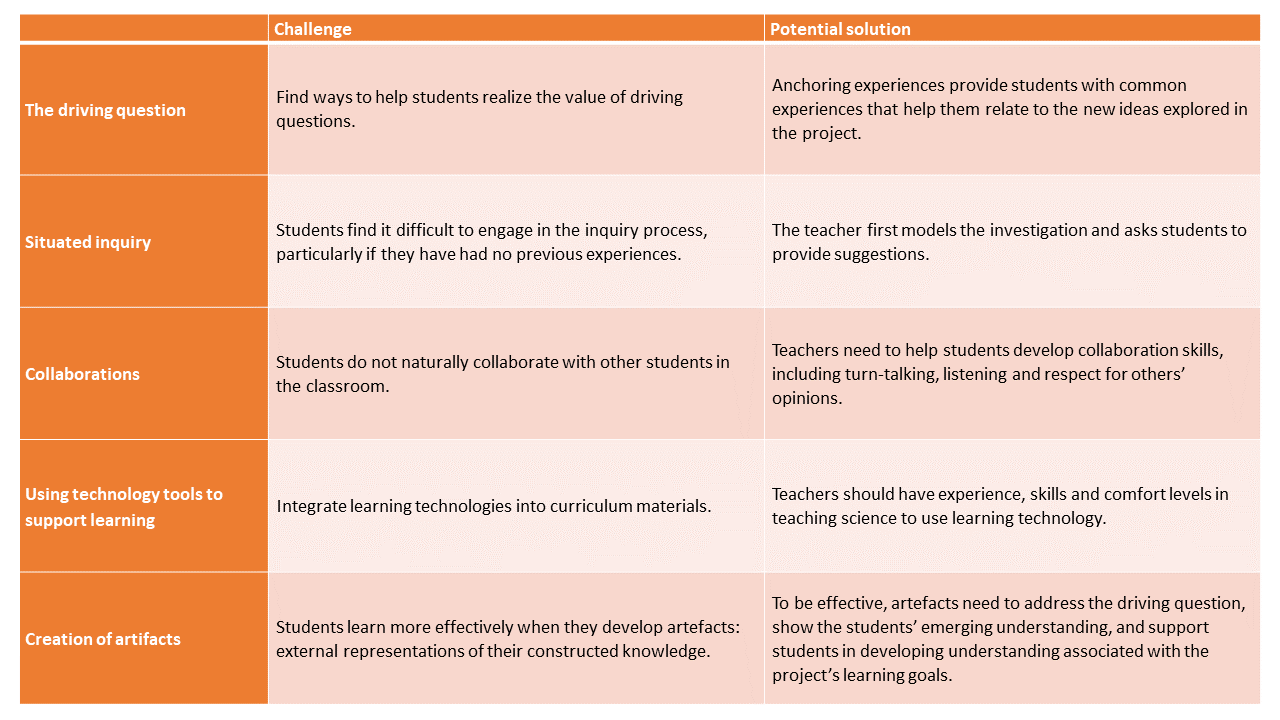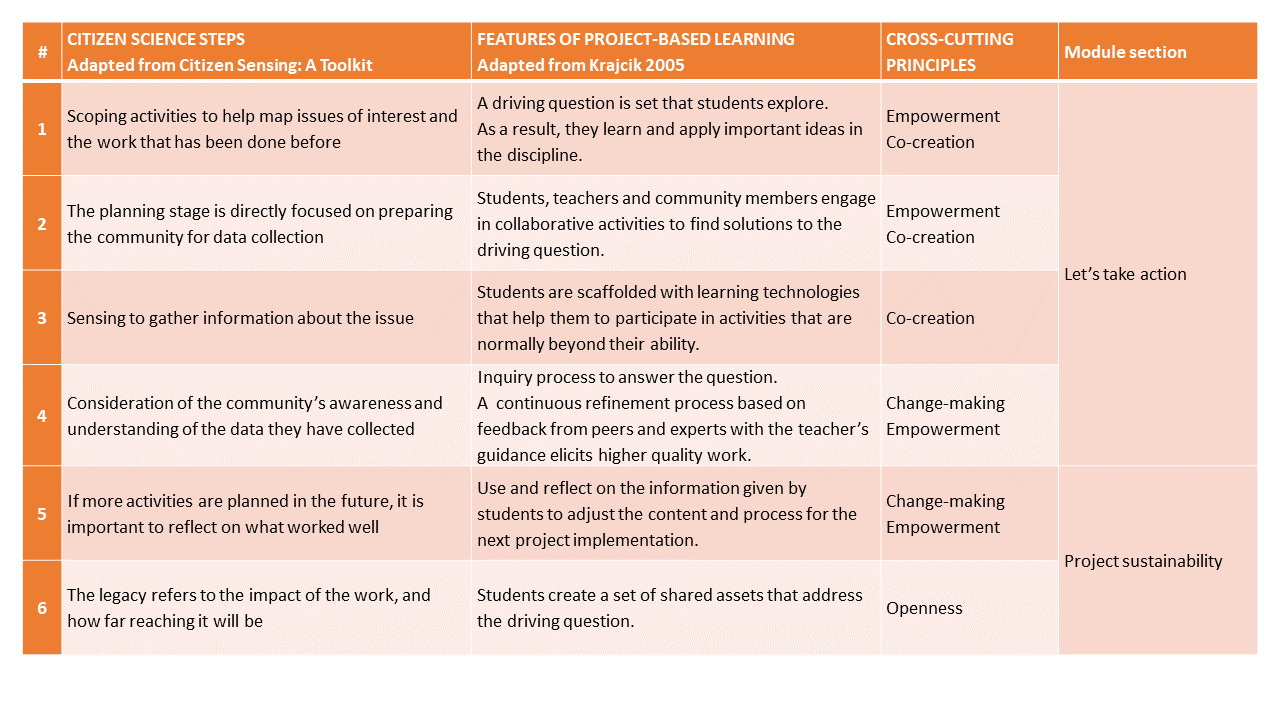This
is a free course of 2 hours that benefits from access to the lessons
learned from COMPASS, a citizen science project competitively funded by
the Spanish Government and aimed to evaluate the usability of a mHealth
intervention in a primary school setting. No prior knowledge in science
reporting is needed for this course.
By the end of this course, the learner will be able to:
Click here to enrol in this course and use enrolment key ClassroomToolkit to do so. Once you enrol you will be able to take quizzes and receive a badge upon successful course completion.
Collaboration using open-source technologies makes it possible to create new, powerful forms of community action, social learning and citizenship. Together we can shape our streets, neighbourhoods, cities and countries – and in turn, shape our future.
We are a group of health researchers and primary school teachers inspired by the empowerment of citizens using innovative methodologies. Our experiences have taught us a number of lessons that we can now share with you in the module “Citizen science in the classroom: A toolkit”. This module is a compilation of our collective knowledge, successes and failures. It offers you tools, methods and inspiration to start your own citizen science project integrated into school curricula.
Our work is informed by a shift towards participatory approaches to science, teaching, policy and health. However, there is a significant barrier to adopting this way of working, as there is little practical information or guidance on how to do it. Participation in science is complex, and it can be helpful to explain a number of techniques and tools that can help the educational community to deliver impactful, participatory projects.
This approach meets the 2030 Agenda for Sustainable Development promoted by the United Nations, particularly Sustainable Development Goal (SDG) 3, ensure healthy lives and promote well-being for all at all ages, and SDG 4, ensure inclusive and equitable quality education. We introduce a set of values and guiding principles that we believe can help inform and guide any meaningful community action.
We are a group of teachers and researchers inspired by the empowerment of citizens. Our experiences have taught us a number of lessons we can now share through the proposed e-learning module. We worked together on the COMPASS project at La Maquinista school.
Members of the working group (in alphabetical order)
Maria José Aparicio – Director of Studies
Núria Codern – Researcher
Anna Comas – Former Headteacher
Jorge L. Díaz – Researcher
María Grau – Principal Researcher
Maria José Harto – Former Director of Studies
Raul Martínez – Headteacher
1. New methodologies for a changing world
How to use project-based learning methodology to scope and build a school community with a shared understanding of the issue of interest.
2. Project-based learning and citizen science: challenges and opportunities
A review of the complementarity between citizen science methodology and project-based learning that makes it possible to design and plan science projects in the classroom.
3. Let’s take action
A description of the process of data collection, analysis and interpretation of the information gathered in this context.
4. Project sustainability
Evaluation to identify the strengths and weaknesses, and legacy creation for lasting impact.
5. COMPASS project: A case study
A review of insights from this citizen science project to evaluate the usability of a mobile health intervention in La Maquinista primary school.
Quiz
at the end of the module with ten questions and one valid answer out of four.
Project-based learning is a form of situated learning and is based on the constructivist finding that students gain deeper understanding of material when they actively construct their understand by working with and using ideas.
In project-based learning, students engage in real, meaningful problems that are important to them and similar to what scientists, mathematicians, writers and historians do. A project-based classroom allows students to investigate questions, propose hypotheses and explanations, discuss their ideas, challenge others’ ideas and try out new ideas.
The theoretical background of project-based learning is built on four major learning ideas.
Adapted from Krajcik JS, Blumenfeld PC. Project Based Learning at Sawyer, R. (Ed.). (2014). The Cambridge Handbook of the Learning Sciences (2nd ed., Cambridge Handbooks in Psychology). Cambridge: Cambridge University Press. doi:10.1017/CBO9781139519526
Table. Challenges and opportunities of Project-Based learning
Adapted from Krajcik JS, Blumenfeld PC. Project Based Learning at Sawyer, R. (Ed.). (2014). The Cambridge Handbook of the Learning Sciences (2nd ed., Cambridge Handbooks in Psychology). Cambridge: Cambridge University Press. doi:10.1017/CBO9781139519526

Definition of crosscutting principles that will be developed in citizen science projects in schools
1. EMPOWERMENT
The feeling of taking control or increased responsibility for yourself and your environment. This can be encouraged with a combination of collaborative approaches and openness using technologies and data that address individual and community issues. This can lead to improved quality of life and greater power to make changes in corporations and governments.
2. CO-CREATION
The practice of collaborative development, and a way to describe an approach to a project using methods and tools for people to work together on a level playing field. Co-creation is a collaborative process between multiple individuals using a wide range of resources and ideas to create new actions and objects.
3. CHANGEMAKING
Our aim of making changes stretches beyond creating awareness of the development of purely technological solutions. It involves change in individuals, communities, institutions and/or cultures, and in thinking, attitudes, values and consciousness. We embrace community-led change.
4. OPENNESS
This applies to the transparency of the project organization, its data and actions.
Table 3. Correspondence between citizen science steps and the features of project-based learning

A core team that will guide all actions should be defined before
starting the project. Preferably, it should include the headteacher and
director of studies, teachers who are directly involved, and researchers.
Quantitative and qualitative evaluation of the COMPASS mobile app: a citizen science project
Scientific publication with the main results of the COMPASS Study
Díaz JL, Codern-Bové N, Zomeño MD, Lassale C, Schröder H, Grau M. Quantitative and qualitative evaluation of the COMPASS mobile app: a citizen science project [published online ahead of print, 2021 Apr 13]. Inform Health Soc Care. 2021;1-13. doi:10.1080/17538157.2021.1902332
https://www.tandfonline.com/doi/abs/10.1080/17538157.2021.1902332?journalCode=imif20
Abstract
To evaluate the usability of the COMPASS application with mixed-methodology, using a citizen science approach. Parents/tutors of 10-11 years old children attending a primary school in Barcelona, Spain, were invited to take part in the study. We conducted semi-structured interviews on a subset (n = 7) of participants, two weeks after using the app for the first time. A list of suggestions of improvement was extracted from the interviews. The System Usability Scale (SUS, range 0-100) was administered to all participants before and after the improvements were implemented. We provide both a quantitative analysis (t-test of change in SUS scores) and a qualitative thematic analysis of the interviews. A total of 22 participants were included in the study. The mean score before implementation of changes was 68.5 (Standard deviation, SD = 11.1), and improved to 73.1 (10.5) (p-value = 0.025). Regarding the qualitative assessment, we obtained 24 codes and grouped them into 3 categories. It uncovered problems in the installation phase and the main barriers to use: lack of time and the need for the app to evolve. The new version of COMPASS, improved by taking into account the participants' comments and suggestions, was more usable than the initial version.
Fernando Hernández, Montserrat Ventura. Organización del curriculum por proyectos, 2008 Octaedro.
Thom Markham with John Larmer and Jason Ravitz. Project Based Learning: A Guide to Standards-Focused Project Based Learning for Middle and High School Teachers. (2003) Buck Institute for Education.
Making Sense. Citizen sensing: A toolkit. Available at: http://making-sense.eu/wp-content/uploads/2018/01/Citizen-Sensing-A-Toolkit.pdf
Escola La Maquinista [La Maquinista Primary School]
Consorcio de Investigación Biomédica en Red: Epidemiología y Salud Pública (CIBERESP) [Consortium of Biomedical Research in Epidemiology and Public Health]
Grupo 30 del https://www.ub.edu/compassConsorcio de Investigación Biomédica en Red: Epidemiología y Salud Pública (CIBERESP) [Group 30 - Consortium of Biomedical Research in Epidemiology and Public Health]
Instituto de Salud Carlos III [Carlos III Health Institute]